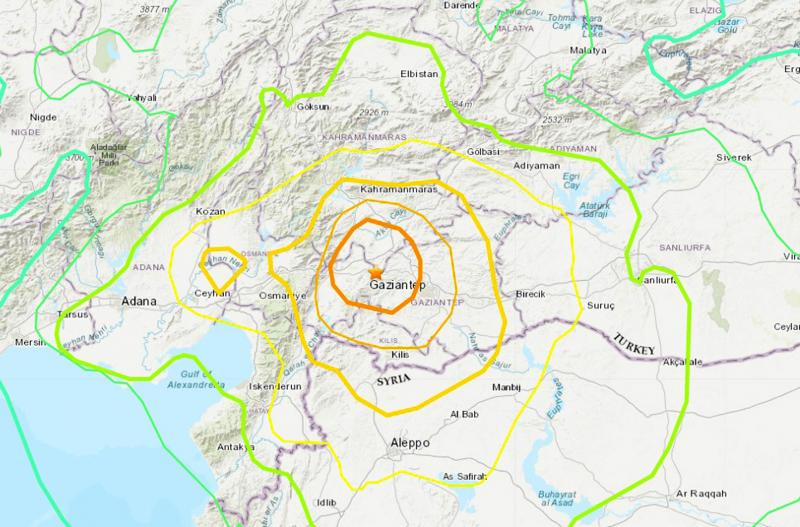The magnitude 7.8 earthquake centered in Turkey’s Kahramanmaras Province on Monday released twice as much seismic energy as the 921 Earthquake, the Central Weather Bureau (CWB) said yesterday.
The magnitude 7.3 earthquake on Sept. 21, 1999, centered near Nantou County’s Jiji Township (集集), was the nation’s most devastating post-World War II earthquake, killing 2,456 people and injuring 10,718.
In the Turkey earthquake, which also affected Syria, more than 11,200 deaths have been reported — with the WHO saying the final toll might reach 20,000 — as well as more than 52,880 people injured.

Photo: Screengrab from Central Weather Bureau website
Seismological Center Director Chen Kuo-chang (陳國昌) told a news conference there are three reasons that the earthquake caused such severe casualties in Turkey and Syria.
“First, it happened at midnight when most people were sleeping,” Chen said.
“Second, videos show that many buildings collapsed when the main earthquake struck and no steel rebar was found in the wreckage,” he added. “It is likely that they were unreinforced brick structures, which have very low resistance to earthquakes.”
“Third, the earthquake triggered large aftershocks,” he said. “Although some buildings were not destroyed by the main quake, they were so damaged that they collapsed in the subsequent shaking.”
Chen said Taiwan does not have as much risk as Turkey of such a large quake.
“For such a large, land-based earthquake to happen, a fault of at least 150km is required, but the longest fault in Taiwan, the Chenglungpu Fault (車籠埔), is 112km, so it has a lower chance of causing a magnitude 7.8 quake,” he said, adding that the fault was discovered after the 921 Earthquake.
Nevertheless, Taiwan’s geological structure could still produce magnitude 7.3 to 7.5 earthquakes, and people should be prepared to cope with damage from such large events, Chen said.

Taiwan is stepping up plans to create self-sufficient supply chains for combat drones and increase foreign orders from the US to counter China’s numerical superiority, a defense official said on Saturday. Commenting on condition of anonymity, the official said the nation’s armed forces are in agreement with US Admiral Samuel Paparo’s assessment that Taiwan’s military must be prepared to turn the nation’s waters into a “hellscape” for the Chinese People’s Liberation Army (PLA). Paparo, the commander of the US Indo-Pacific Command, reiterated the concept during a Congressional hearing in Washington on Wednesday. He first coined the term in a security conference last

Prosecutors today declined to say who was questioned regarding alleged forgery on petitions to recall Democratic Progressive Party (DPP) legislators, after Chinese-language media earlier reported that members of the Chinese Nationalist Party (KMT) Youth League were brought in for questioning. The Ministry of Justice Investigation Bureau confirmed that two people had been questioned, but did not disclose any further information about the ongoing investigation. KMT Youth League members Lee Hsiao-liang (李孝亮) and Liu Szu-yin (劉思吟) — who are leading the effort to recall DPP caucus chief executive Rosalia Wu (吳思瑤) and Legislator Wu Pei-yi (吳沛憶) — both posted on Facebook saying: “I

The Ministry of Economic Affairs has fined Taobao NT$1.2 million (US$36,912) for advertisements that exceed its approved business scope, requiring the Chinese e-commerce platform to make corrections in the first half of this year or its license may be revoked. Lawmakers have called for stricter enforcement of Chinese e-commerce platforms and measures to prevent China from laundering its goods through Taiwan in response to US President Donald Trump’s heavy tariffs on China. The Legislative Yuan’s Finance Committee met today to discuss policies to prevent China from dumping goods in Taiwan, inviting government agencies to report. Democratic Progressive Party Legislator Kuo Kuo-wen (郭國文) said

The Ministry of Economic Affairs has fined Taobao NT$1.2 million (US$36,900) for advertisements that exceeded its approved business scope and ordered the Chinese e-commerce platform to make corrections in the first half of this year or its license would be revoked. Lawmakers have called for stricter supervision of Chinese e-commerce platforms and more stringent measures to prevent China from laundering its goods through Taiwan as US President Donald Trump’s administration cracks down on origin laundering. The legislature’s Finance Committee yesterday met to discuss policies to prevent China from dumping goods in Taiwan, inviting government agencies to report on the matter. Democratic Progressive Party